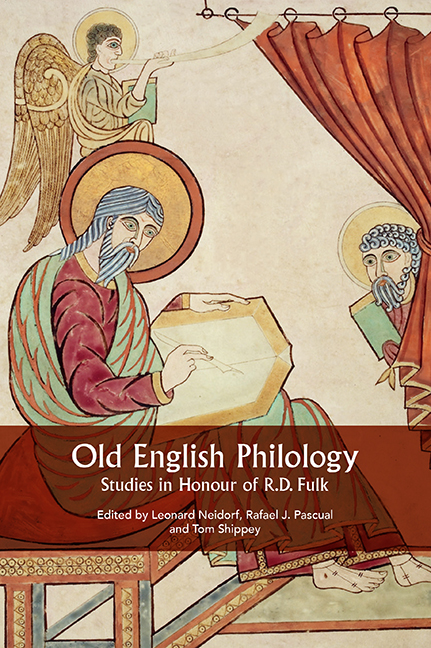Book contents
- Frontmatter
- Contents
- List of Illustrations
- Acknowledgements
- List of Contributors
- Introduction: R.D. Fulk and the Progress of Philology
- 1 Sievers, Bliss, Fulk, and Old English Metrical Theory
- 2 Ictus as Stress or Length: The Effect of Tempo
- 3 Metrical Criteria for the Emendation of Old English Poetic Texts
- 4 The Suppression of the Subjunctive in Beowulf: A Metrical Explanation
- 5 Metrical Complexity and Verse Placement in Beowulf
- 6 Alliterating Finite Verbs and the Origin of Rank in Old English Poetry
- 7 Prosody-Meter Correspondences in Late Old English and Poema Morale
- 8 The Syntax of Old English Poetry and the Dating of Beowulf
- 9 The Anglo-Saxons and Superbia: Finding a Word for it
- 10 Old English gelōme, gelōma, Modern English loom, lame, and Their Kin
- 11 Worm: A Lexical Approach to the Beowulf Manuscript
- 12 Wulfstan, Episcopal Authority, and the Handbook for the Use of a Confessor
- 13 Some Observations on e-caudata in Old English Texts
- 14 The Poetics of Poetic Words in Old English
- 15 Dream of the Rood 9b: A Cross as an Angel?
- 16 The Fate of Lot’s Wife: A ‘Canterbury School’ Gloss in Genesis A
- 17 Metrical Alternation in The Fortunes of Men
- 18 The Originality of Andreas
- 19 The Economy of Beowulf
- 20 Beowulf Studies from Tolkien to Fulk
- The Writings of R.D. Fulk
- Index
- Tabula Gratulatoria
- Anglo-Saxon Studies
18 - The Originality of Andreas
Published online by Cambridge University Press: 29 May 2021
- Frontmatter
- Contents
- List of Illustrations
- Acknowledgements
- List of Contributors
- Introduction: R.D. Fulk and the Progress of Philology
- 1 Sievers, Bliss, Fulk, and Old English Metrical Theory
- 2 Ictus as Stress or Length: The Effect of Tempo
- 3 Metrical Criteria for the Emendation of Old English Poetic Texts
- 4 The Suppression of the Subjunctive in Beowulf: A Metrical Explanation
- 5 Metrical Complexity and Verse Placement in Beowulf
- 6 Alliterating Finite Verbs and the Origin of Rank in Old English Poetry
- 7 Prosody-Meter Correspondences in Late Old English and Poema Morale
- 8 The Syntax of Old English Poetry and the Dating of Beowulf
- 9 The Anglo-Saxons and Superbia: Finding a Word for it
- 10 Old English gelōme, gelōma, Modern English loom, lame, and Their Kin
- 11 Worm: A Lexical Approach to the Beowulf Manuscript
- 12 Wulfstan, Episcopal Authority, and the Handbook for the Use of a Confessor
- 13 Some Observations on e-caudata in Old English Texts
- 14 The Poetics of Poetic Words in Old English
- 15 Dream of the Rood 9b: A Cross as an Angel?
- 16 The Fate of Lot’s Wife: A ‘Canterbury School’ Gloss in Genesis A
- 17 Metrical Alternation in The Fortunes of Men
- 18 The Originality of Andreas
- 19 The Economy of Beowulf
- 20 Beowulf Studies from Tolkien to Fulk
- The Writings of R.D. Fulk
- Index
- Tabula Gratulatoria
- Anglo-Saxon Studies
Summary
The extraordinary 1722-line Old English poem Andreas, preserved uniquely on fols 29v–52v of the late tenth-century Vercelli Book (Vercelli, Biblioteca Capitolare, CXVII [s. x2, SE England (Canterbury, St Augustine’s? Rochester?)]), where it is by far the longest text in the manuscript, has seemed many things to modern scholars and readers over the years, combining as it does elements of cannibalism, conversion, incarceration, and inundation, all told in more or less overblown and lurid language (for an extensive bibliography up to 2007, see Remley 2009; more recent studies include Godlove 2009, Brady 2010, Michelet 2011, and North and Bintley 2016). Earlier commentators (Fritzsche 1879, Ramhorst 1885, Sarrazin 1886, Cremer 1888, and Buttenwieser 1898) tried to show that Andreas was like Beowulf or the signed poems of Cynewulf; later ones attempted to assess what it was about the poem that made Andreas seem at once both familiar and different, occasionally grumbling that it was not like Beowulf or the signed poems of Cynewulf nearly enough (Brodeur 1968, Bjork 1985, and Boenig 1991a). Likewise, while a deluge of articles have considered such questions as on the one hand the poem's use of figural narrative (Hill 1966 and 1969, Trahern 1970, Hamilton 1972, Szittya 1973, Casteen 1974, Walsh 1977, Earl 1980, and Calder 1986), and on the other its apparent departures from a putative source (Riemer 1965, Boenig 1991b, Biggs 2007, and Friesen 2008), neither approach seems ultimately to have proven wholly fruitful. While many of the figurative readings have advanced appreciation of individual parts of the poem, the fact that no surviving version of what M.R. James (1953: 453) rightly described as “a tale of wonder with no doctrinal purpose,” whether in Greek or Latin or any other language, seems particularly closely to reflect the text that underlies Andreas (Blatt 1930) tends to thwart too close a comparison. Moreover, the whole martial and heroic tone of Andreas, evident immediately in its opening lines, and including several episodes and elaborations unmatched in any analogue, seems strongly to suggest innovation on the part of a poet well-versed (as it were) in a peculiarly Anglo-Saxon traditional diction and poetic style.
- Type
- Chapter
- Information
- Old English PhilologyStudies in Honour of R.D. Fulk, pp. 331 - 370Publisher: Boydell & BrewerPrint publication year: 2016
- 4
- Cited by

